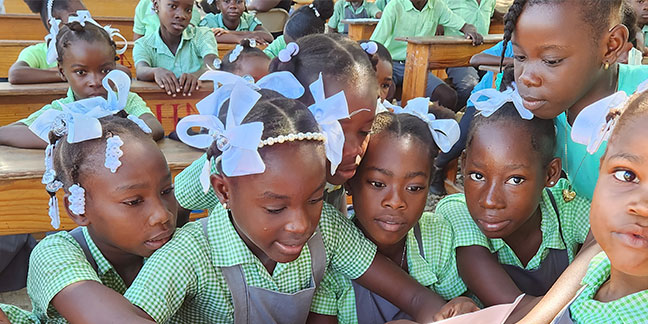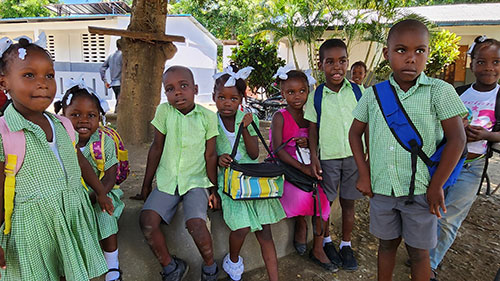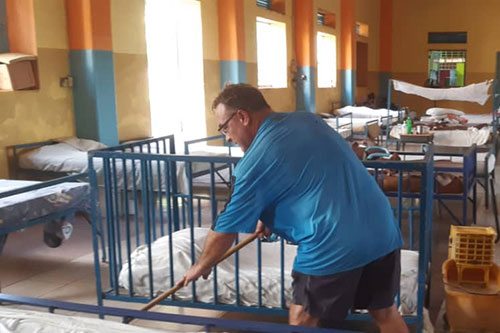St. Matthew Parish recently packed its 3 millionth meal for the Haitian people – a remarkable feat. But what does their help look like on the ground?
Follow Deacon Daren Bitter to the long-suffering island nation to see the fruits of the parish’s decades-long effort to ease poverty in northern Haiti.
 Students of St. Marc Catholic School in Tremesse, Haiti, gather to celebrate the recent dedication of new permanent classrooms and a trade school. St. Marc School is named for St. Mark the Evangelist and the late Mark Creasser, a parishioner of St. Matthew and founder of Hands for Haiti, a Charlotte-based nonprofit that helped start the school in 2009. (Photos provided by Deacon Daren Bitter) CAP-HAITIEN, HAITI — When Deacon Daren Bitter walked into the homeless shelter in Cap-Haitien, Haiti, for the first time in four years, he could not believe his eyes. The children, once abandoned and malnourished, had become strong, healthy and happy.
Students of St. Marc Catholic School in Tremesse, Haiti, gather to celebrate the recent dedication of new permanent classrooms and a trade school. St. Marc School is named for St. Mark the Evangelist and the late Mark Creasser, a parishioner of St. Matthew and founder of Hands for Haiti, a Charlotte-based nonprofit that helped start the school in 2009. (Photos provided by Deacon Daren Bitter) CAP-HAITIEN, HAITI — When Deacon Daren Bitter walked into the homeless shelter in Cap-Haitien, Haiti, for the first time in four years, he could not believe his eyes. The children, once abandoned and malnourished, had become strong, healthy and happy.
“When I saw Steven, now a teenager, he was bigger than I am,” the astounded deacon says. “He and others were football-player big. I was like, ‘Come on. This is amazing!’ It brought joy to my heart.”
Because of pandemic travel restrictions, it had been too long since Deacon Bitter was able to visit his friends at the Asile Communal, where those with special needs, the elderly, sick and abandoned are cared for by religious brothers from the Missionaries of the Poor.
The long-awaited trip came just a few weeks after the 3 millionth meal milestone in his parish’s herculean efforts to pack as much food as possible for the Haitian people. In early September, Deacon Bitter of St. Matthew Parish in Charlotte finally boarded a plane bound for Haiti. It was his fifth visit in 10 years of volunteering with his parish and the
Hands for Haiti nonprofit, an organization founded by members of St. Matthew that coordinates charitable work in Haiti year-round.
Since the 1990s, the parish has given more than 3.4 million meals as well as medical supplies to places in need around the world and Charlotte. Most of the aid goes to Haiti, however, where nearly half the people suffer from hunger.
Deacon Bitter credits the vast improvement in the children’s health to the constant stream of food and medicine.
“These kids look tremendous,” he says, “but if you go outside the front door, it’s the opposite.”
Deacon Bitter also traveled to nearby Tremesse to reunite with the students and faculty of St. Marc Catholic School, also supported by St. Matthew Parish and Hands for Haiti.
Of the children living at the Asile, Deacon Bitter says, “They’re well-behaved kids and are growing up together. They don’t have a mom or a dad. If they do, they’re not there. It’s the religious brothers and hopefully a teacher who’s giving them guidance.”
Here I am, Lord
 Few people would voluntarily travel to Haiti right now. Embroiled in chaos, violence and abject poverty, the Caribbean nation continues to suffer greatly two years after the assassination of President Jovenel Moïse and devastating earthquakes.
Few people would voluntarily travel to Haiti right now. Embroiled in chaos, violence and abject poverty, the Caribbean nation continues to suffer greatly two years after the assassination of President Jovenel Moïse and devastating earthquakes.
The U.S. State Department has strongly advised Americans not to travel there, and the U.S. embassy warns of violent crime against U.S. citizens. Recent reports of the U.N.-backed deployment of a Kenyan police force accused of human rights abuses to Haiti have fanned the flames.
The government has stopped functioning, making it dangerous for anyone providing aid to operate in Haiti. The power grid is also down. In fact, the power, including generators, did not work for the entirety of Deacon Bitter’s trip.
Yet he has not been fazed. Haiti has a hold on his heart.
“The Haitian people are phenomenal. Their joy is just incredible, despite the poverty and acute hunger. They’re grateful, they’re thankful, and I’m not talking about just the people that we’re taking care of,” he says. “My heart wells up when I think about it. All they have anymore is hope, and we try to amplify that through love and prayers and support and just being visible.”
The late Mark Creasser, a St. Matthew parishioner and founder of Hands for Haiti, encouraged Deacon Bitter to get involved all those years ago.
“When someone asks you to do something like this, you have questions like, ‘What am I going to do when I get there, how can I help, what’s my job?’” he says. “But then it just transitioned to becoming part of who I am, part of my fabric, my DNA.”
It certainly flows from his identity as a deacon.
“As ministers of Charity, deacons are leaders in identifying the needs of others, then marshaling the Church’s resources to meet those needs,” the U.S. Conference of Catholic Bishops states. “Deacons are also dedicated to eliminating the injustices or inequities that cause such needs.”
Deacon Bitter is doing his part.
Between the World Hunger Drive and the hundreds of thousands of dollars the 37,000-member parish has raised for educational and sustainability projects in Haiti, it’s a massive undertaking.
Some of the projects include a chicken coop, tilapia pond, sewing trade school and an agricultural training center. St. Marc School employs 65 Haitians as faculty and staff, including the school’s administrator, Father Leon Sejour of the Archdiocese of Cap-Haïtien.
“When you experience all the love, prayers, joy, energy and hopefulness around the World Hunger Drive at St. Matthew and then you see the recipient of that goodness, it’s incredible because it’s happening between people who will never meet,” Deacon Bitter says, adding that he considers himself blessed.
“Fortunately for myself and some others who do go to Haiti, you can see both ends of that effort and the long-term result. When you start to look at it over the arc of time and you start thinking about education and sustainability in addition to the food nutrition, it’s mind boggling.”
Blessings abound
 Deacon Bitter – as well as St. Matthew parishioners Steven Favory, executive director of Hands for Haiti, and Ernest Dwight, chairman of the board for the organization – had many more pleasant surprises during their trip.
Deacon Bitter – as well as St. Matthew parishioners Steven Favory, executive director of Hands for Haiti, and Ernest Dwight, chairman of the board for the organization – had many more pleasant surprises during their trip.
St. Marc School, which started years ago as four sticks with a tarp over it and a dozen or so students, recently doubled again in size to include additional permanent classrooms and a trade school. The K-12 school’s enrollment is about 380 students, and it recently graduated its first college-bound student.
Hundreds of community partners and local officials, including the chancellor and vicar general of the Cap-Haïtien archdiocese and the brothers from the Missionaries of the
Poor, joined the students and teachers for the Sept. 15 dedication of St. Marc’s new classrooms.
For Deacon Bitter and his Hands for Haiti friends, it’s not just another mission trip.
“It’s changed into something I truly, truly enjoy,” he says. “We go down there thinking that we’re going to solve all the problems and fix things and wear a cape and do all kinds of good stuff, and we did, but I come back, and I’m always so fed by that experience.”
— Annie Ferguson


